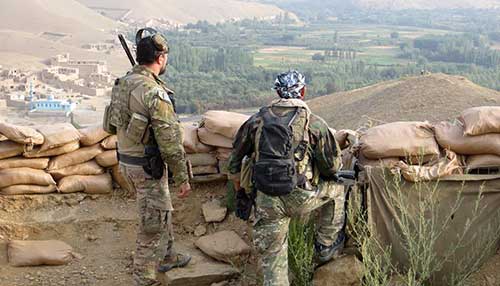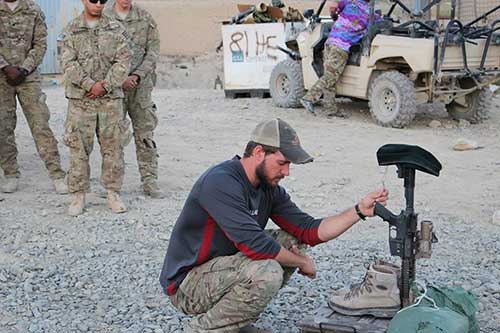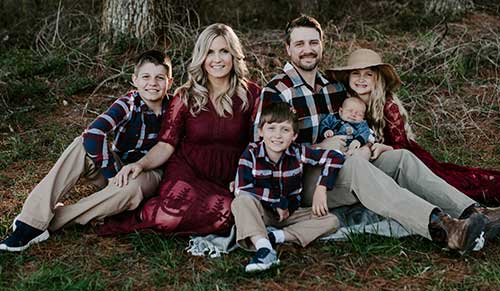Dallas Bozeman tenderly dug through the dirt, a brown mix of Afghan sand and stone. His gloved hands gently scrape aside the light brown soil of Afghanistan.
He was looking for a bomb.
The U.S. Air Force trained Bozeman to do this. On his third tour, not far from Kandahar, he was hunting the Taliban with Canadian reconnaissance forces.
“I have a heart to do difficult things and go to difficult places,” he said. “I’m passionate about seeing people who are oppressed be free. I’m passionate about those afflicted and forgotten and those with no hope.”
Giving freedom to others is perilous and uncertain
In 2010, Bozeman attached to the Canadian unit battling against a Taliban stronghold in the Panjwai area of Afghanistan. Rugged riverbeds and widespread vineyards prevented driving. So, Bozeman couldn’t bring bomb suits or high-tech robots here.

Instead, this 2010 offensive meant soldiers ground-pounded long marches. At the same time, bombmakers were designing explosives that were much harder to find than earlier forms of explosives.
“They figured out how to make these devices with almost no magnetic signature,” Bozeman explained this year. “Metal detectors don’t find them. There were so many of them ― more going off than we found.”
Bozeman asked for this
When joining the Air Force in 2003, the Alabama teenager asked recruiters what the hot jobs were. Explosive Ordnance Disposal training, they told him, while stressing only 20 percent of EOD students graduate.
Bozeman was one of them.
Three years later, he was in Iraq for the first time. Four years after that, he was on his knees in the dirt near Kandahar, his fingers easing around a bomb.
“There’s a ton of anxiety,” he said. “Now I’m taking apart all these bombs by hand. Getting down on your hands and knees, raking through the dirt with your fingers to find the edges of these devices so you can take them apart before they kill somebody.”
One time, an Afghan man suffered severe injuries while partnered with coalition forces. Bozeman had advanced medical care training and assisted medical staff in treating the partner’s injuries.
However, they couldn’t preserve the Afghan man’s life despite their best efforts. Then, the Afghan realized his death was unavoidable.
“He starts to cry out ‘Allah, Allah,” Bozeman remembered. “I’ll never forget watching this guy, crying out to this god that doesn’t exist.”
Seeing many die ― that Afghan man, a three-year-old girl exploited as a human shield, a Green Beret sergeant on Bozeman’s fourth tour ― wounded the Alabaman’s heart. His nominal faith bestowed by a Bible-belt culture splintered. So, Bozeman bolstered himself with pain pills, alcohol and adultery.
Related: God transforms life of former cop who sought refuge in drugs, alcohol
Even so, God was going to redeem a significant, though small, expression of the life he’d given Bozeman.
A soldier tries to rescue himself
Bozeman did one last tour in 2013, where he saw his sergeant, that Green Beret, die. Bozeman worked in the medical tent helping clean the sergeant’s gear and preparing his possessions to send home.
As he did so, he wondered why a good leader died while Bozeman ― addicted to drugs and alcohol and unfaithful to his wife ― lived.
“He was a man’s man anybody could follow and had the best sense of humor,” Bozeman remembers of the sergeant.

That death fused the pain and loss into a desperate desire to do something ― anything ― else. Then, Bozeman was wounded in battle and sent home to recover.
“This isn’t the lifestyle for me anymore; something’s got to change,” he felt in 2014.
His father had worked in deepwater oil and financially had done well. So, Dallas decided to go that route to make a lot of money and put his family back together. He and his wife Kimberly bought a big house near Houston with a huge kitchen and a pool.
“I realized pretty quickly in the first year that the big house, big car and pool didn’t change anything,” he said. “All the same problems we had before, we just had them in a bigger house.”
An angry sky daddy rules the world
Bozeman was coaching at a CrossFit gym in 2015 when he met Les. At the time, Les invited men to read the Scriptures together at his home. Generally, these were men who didn’t trust God because of devastation in their lives.
The first time Bozeman went, Les asked every guy to describe God. Bozeman called God an angry sky daddy, a bully with a magnifying glass.
“That doesn’t sound like a god I would want to follow,” Les responded. “That’s why I don’t,” Bozeman shot back.
Related: Articulating God’s truth in an unbelieving age
Les told Bozeman to go home, pick a book of the Bible and read it for himself. Bozeman chose Romans; Rome had soldiers, so maybe the book would be good.
“I read about how unworthy I was and how broken humanity was and how much we need a savior,” Bozeman said. “And then the good news that God sent a savior and loved us while we were still sinners. For the first time, the gospel made sense.”
Bozeman gave his life to Christ in his bedroom, surrendering to the God who had been pursuing him for years. The mercy and salvation of God continued to increase in Bozeman’s life.
With God’s help, he overcame his addiction to painkillers and alcohol. He and Kimberly faced their struggles in marriage and saw God slowly rebuild their family.
The Bozemans slowly helped other married couples work through issues, teaching others how God had restored their marriage. Faith and transformation were restoring and redirecting the Bozemans’ life.
Hail stops one hunt, starts another
Later in 2015, Dallas met Brody Holloway, who came to Texas for business development. When a hail storm knocked out the electricity, Bozeman and Holloway started sharing life stories.
Holloway listened to Bozeman’s tale of devastation and deliverance. Then he invited Dallas to speak at a men’s retreat at Snowbird Wilderness Outfitters in the fall of 2016. Holloway is part of that North Carolina ministry.
Bozeman said yes to that opportunity. Then, he was invited back again in the spring of 2017. They asked Bozeman to preach on the second trip, not just tell his story.
Thinking the request was lunacy, he still said yes. After he preached, Bozeman expected Snowbird staff to dress him down.
Related: When someone asked Avi Nunez to preach, he thought they were crazy. Now he’s a church planter.
Instead, they offered him a job in ministry. They promised an environment to develop his gifts for serving the Lord.
They acknowledged they couldn’t pay much compared to the oil industry. But Bozeman had a gift that they pledged to help develop.
Once back in Texas, he and Kimberly were in their enormous kitchen, looking at their hot tub and talking about the opportunity. Ministry means leaving the house in Houston. They would live off a veteran’s disability check plus whatever the ministry can pay.
“I think God’s worth it,” Kimberly told Dallas through tears.

So, they packed up and moved their kids to the mountains of North Carolina. Bozeman became an excellent fit for the ministry, working with international partners in hard-to-reach places. For example, he studied Philippians with Muslim background believers near the border of India and Pakistan.
“This is what it’s about,” he said. “This is worth giving it all up. That’s where my heart for missions grew.”
In 2018, he went to Togo on Snowbird’s behalf. While there, Bozeman met members of Converge’s 6 Degree Initiative team.
He quickly realized these West Africans had lived under oppression for centuries. Voodoo was birthed in Togo and neighboring Benin and continues to wield influence throughout the region. Witch doctors and spirits create a dynamic of power and fear that afflict people. But Christ’s gospel sets people free again and again, doing what voodoo won’t and can’t.
I’m no missionary, but what if…?
Bozeman had breakfast with Converge staff while in Togo on that trip. He quickly dispelled any idea he might be a missionary because of his past.
But hours later, he asked his wife, “What if the Lord asked us to be missionaries in West Africa?”
“She said the same thing she said that night in the kitchen when we left that big house,” Bozeman said. “‘If that’s what he wants us to do, he’s worth it.’ I knew we were going to West Africa.”
Still, the Bozemans were patient. First, they prayed and talked with Converge staff on video calls and learned more. Then, in 2018, they participated in the Missionary Discovery and Assessment, which helps to clarify people’s gifts and strengths, personal identity and fitness for overseas ministry.
Related: Preventing and recovering from pastoral failure
Bozeman thought the assessment would be more challenging ― and end differently ― than the Air Force school for deactivating bombs.
“When we laid out all the horrible things I was a part of during my four tours ― the addiction, the adultery ― Converge said, ‘What a powerful testimony of God’s grace in your life,’” he said. “We were kind of overcome. These are our people because of the grace, the diversity for the people they allow to be part of the movement.”
A global work from a local place
There is a Bible institute in Togo, created to strengthen believers and churches toward a goal of making 190,000 new disciples from 10 people groups. In addition, the 6 Degree Initiative aims to help 30 Togolese pastors earn a Master of Divinity degree before 2032.
Bozeman, who now lives full-time in Alabama with his family, takes pastors and Christian professors to Togo several times a year. These teachers supply Biblical training and education to ministry leaders.
“We have to be deadset on creating the next generation of pastors and leaders who will thrive and reproduce disciple-making efforts in that country,” he said. “The pandemic taught us we can be a week away from never getting back in that country again. Just that fast, we can be gone.”
Josh Freeman is on the Converge team in Togo and Benin. He recognizes how Bozeman’s work for the institute supports the gospel’s advance.
“With the help of this institute that will train more church planters, we will see significantly more disciples across more unreached people groups in the years to come.,” Freeman said.
Moreover, being based in Alabama means Bozeman can support the Converge team in a way he couldn’t from Togo.
For example, Bozeman travels to American churches that are partnered with the initiative or could be. He shares his passion for vision casting and helps with planning and fundraising. All of that would be harder to do from Togo and probably happen less often with less success.
Standing today on Alabama’s red clay, Bozeman plans to touch Togo’s soil again and again. The 36-year-old who gently dug for bombs in Afghanistan’s light brown dirt has a fuller expression of his identity.
“I’d given a decade of my life to free people from temporary oppression,” he said of shifting from military to ministry. “Why wouldn’t I give my life to try and free people from eternal oppression?
Converge is asking God for a gospel movement among every least-reached people group – in our generation. Learn how we are playing a role in accomplishing the Great Commission and how you can be involved.